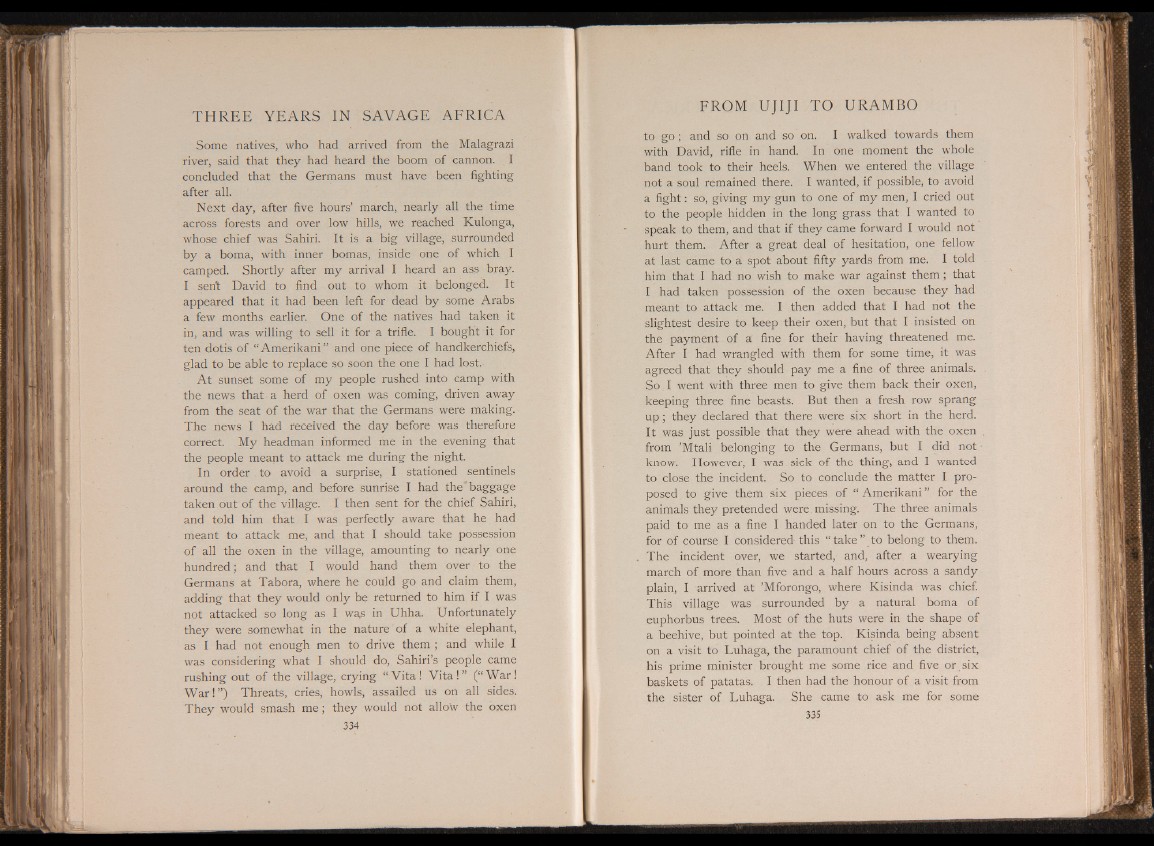
Some natives, who had arrived from the Malagrazi
river, said that they had heard the boom of cannon. I
concluded that the Germans must have been fighting
after all.
Next day, after five hours’ march, nearly all the time
across forests and over low hills, we reached Kulonga,
whose chief was Sahiri. It is a big village, surrounded
by a boma, with inner bomas, inside one of which I
camped. Shortly after my arrival I heard an ass bray.
I sent David to find out to whom it belonged. It
appeared that it had been left for dead by some Arabs
a few months earlier. One of the natives had taken it
in, and was willing to sell it for a trifle. I bought it for
ten dotis of “Amerikani” and one piece of handkerchiefs,
glad to be able to replace so soon the one I had lost.
At sunset some of my people rushed into camp with
the news that a herd of oxen was coming, driven away
from the seat of the war that the Germans were making.
The news I had received the day before was therefore
correct. My headman informed me in the evening that
the people meant to attack me during the night.
In order . to avoid a surprise, I stationed sentinels
around the camp, and before sunrise I had the'baggage
taken out of the village. I then sent for the chief Sahiri,
and told him that I was perfectly aware that he had
meant to attack me, and that I should take possession
of all the oxen in the village, amounting to nearly one
hundred; and that I would hand them over to the
Germans at Tabora, where he could go and claim them,
adding that they would only be returned to him if I was
not attacked so long as I was in Uhha. Unfortunately
they were somewhat in the nature of a white elephant,
as I had not enough men to drive them ; and while I
was considering what I should do, Sahiri’s people came
rushing out of the village, crying “ Vita! V ita !” (“ War!
War!”) Threats, cries, howls, assailed us on all sides.
They would smash me; they would not allow the oxen
334
to go ; and so on and so on. I walked towards them
with David, rifle in hand. In one moment the whole
band took to their heels. When we entered the village
not a soul remained there. I wanted, if possible, to avoid
a fight: so, giving my gun to one of my men, I cried out
to the people hidden in the long grass that I wanted to
speak to them, and that if they came forward I would not
hurt them. After a great deal of hesitation, one fellow
at last came to a spot about fifty yards from me. I told
him that I had no wish to make war against them; that
I had taken possession of the oxen because they had
meant to attack me. I then added that I had not the
slightest desire to keep their oxen, but that I insisted on
the payment of a. fine for their having threatened me.
After I had wrangled with them for some time, it was
agreed that they should pay me a fine of three animals.
So I went with three men to give them back their oxen,
keeping three fine beasts. But then a fresh row sprang
up; they declared that there were six short in the herd.
It was just possible that they were ahead with the oxen
from ’Mtali belonging to the Germans, but I did not
know. However, I was sick of the thing, and I wanted
to close the incident. So to conclude the matter I proposed
to give them six pieces of “ Amerikani ” for the
animals they pretended were, missing. The three animals
paid to me as a fine I handed later on to the Germans,
for of course I considered this “ take” to belong to them.
The incident over, we started, and, after a wearying
march of more than five and a half hours across a sandy
plain, I arrived at ’Mforongo, where Kisinda was chief.
This village was surrounded by a natural boma of
euphorbus trees. Most of the huts were in the shape of
a beehive, but pointed at the top. Kisinda being absent
on a visit to Luhaga, the paramount chief of the district,
his prime minister brought me some rice and five or six
baskets of patatas. I then had the honour of a visit from
the sister of Luhaga. She came to ask me for some